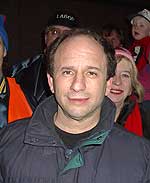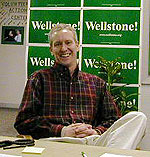Money, broken pledge may dominate Wellstone re-election bid
By Mark Zdechlik
Minnesota Public Radio
February 11, 2002
|
| RealAudio |
Minnesota's senior U.S. Sen. Paul Wellstone plans to officially kick off his reelection campaign in late spring. Wellstone has been busy raising money for a race that's likely to break Minnesota campaign spending records. With control of the closely divided Senate at stake, the contest between Wellstone and his likely GOP opponent, Norm Coleman, has major national implications. And with President Bush planning to help Coleman, political observers say Wellstone is by not a shoe-in for re-election.
| |
|
|
|
||
As the political science professor turned lawmaker seeks a third term in the U.S. Senate, don't expect a reinvented Paul Wellstone. Wellstone will sell himself to voters heading into this fall much the same way he's previously campaigned - as a loud voice in the Senate for those who aren't often heard.
In seeking another six-year term, Wellstone is breaking a self-imposed term-limit pledge. Early last year, he announced plans to run again, citing a newly elected Republican in the White House and a then Republican-controlled Senate.
"Do you walk away from government in Washington D.C. right now when so much is at stake? And my answer, was: no you can't. You shouldn't," he said.
Supporters cheered the decision. Critics accused Wellstone of becoming just another politician. Minnesota's Republican House Majority Leader labelled Wellstone "Potomac Paul."
Getting ready for a recent Winter Carnival parade appearance, Wellstone declined to discuss campaign strategy, but said he's looking forward to getting out on the stump.
"I love campaigning and the volunteers and how you get as much kind of, if you will, people support as possible. And I love parades and I you know I love just being in coffee shops, so we'll do a lot of that. That's always the way we've done it," he said.
For the third time, Wellstone has tapped Jeff Blodgett as his campaign manager. The re-election operation is headquartered, once again, along an industrial stretch of University Ave., between Minneapolis and St. Paul.
Blodgett says like previous Wellstone campaigns, this year's will rely heavily on a broad coalition of volunteers.
"Primarily we're running phone banks, volunteer phone banks where we're calling everyone on our list of supporters. We have a list of supporters with about 70,000 names and we're calling through every name on that list; everyone we can reach that goes all the way back to 1990 and asking them to be part of this campaign," he says.
|
"If this becomes a critical race, you're going to see tons of money pouring into the race."
- Larry Noble, Center for Responsive Politics |
Blodgett says the campaign will highlight Wellstone's legislative successes, which he says include improving conditions for veterans, bolstering workforce development and domestic abuse programs, and requiring insurance companies to provide more mental health coverage.
He says Wellstone will also talk about successes in stopping efforts to drill for oil in the Arctic National Wildlife Refuge and battles that lie ahead surrounding that and several other matters dividing Congress.
"On the issues around pension security, on patients' bill of rights and a prescription drug benefit, protecting Social Security, those are all things that he works on on an ongoing basis. We haven't had victories on those yet, but those are arguments to send him back so he can keep working on those things," his campaign manager says.
Wellstone has been in Senate for nearly 12 years. Still, Blodgett is drawing on the same David versus Goliath comparison that's worked for Wellstone in the past.
The giant this time around is former St. Paul Mayor Norm Coleman. So far, Coleman is the only Republican challenger to surface. He got in the race at the request of President Bush.
A self-described common sense conservative, Coleman is the political polar opposite of Wellstone. The Republican will try to portray Wellstone as a constant critic, while promoting himself as a team player with a strong track of record of getting things done.
"I'm not looking to attack the incumbent," Coleman says. "I think there are fundamental differences on issues such as taxes, there's issues such as welfare reform; I could go on issue after issue, but I really think fundamentally the difference today beyond the clear differences in issues, is one of how do you approach this job."
| |
|
|
|
||
Coleman, a former Democrat who became a Republican in 1996, says Wellstone's decision to break his promise not to seek a third term will amount to a trust issue for voters to decide.
If Wellstone is the voice of dissent, Blodgett says Coleman can be counted on to side with the White House and big business. Blodgett says he thinks most Minnesotans respect Wellstone's integrity even in cases where they're at odds with the liberal senator's ideology.
Still Blodgett says the incumbent faces a formidable challenge thanks to President Bush.
"This will be a very close race. We anticipate it's going to be very hard fought. We've got an opponent who has the backing of the White House so our opponent will have all the money he needs," he says.
So likely will Wellstone if the race stays as tight as early polls suggest with Wellstone enjoying only a slight lead over Coleman.
"If this becomes a critical race, you're going to see tons of money pouring into the race," says Larry Noble, the executive director of the Center for Responsive Politics, a Washington-based non-partisan group which advocates for campaign finance disclosure.
"It will pour in in two different directions - one in terms of direct contributions to the candidates, but more importantly what will happen is a tremendous amount of soft money or unregulated money will pour into the state and I think the citizens of the state will see a lot of so-called issues ads that do everything but call for the election of the candidate. They talk about the issues, talk about the candidates who's good and who's not good because it will become a major battlefield," Noble predicts.
The most recent Federal Election Commission reports shows Wellstone raised about $4 million last year, compared to Coleman's nearly $2.1 million. Wellstone ended the year with about $2 million in cash. Coleman had nearly $1.5 million.
Both candidates acknowledge a lot of their campaign money will come from outside of Minnesota.
Gustavus Adolphus College political science professor Chris Gilbert predicts spending for this year's Senate race will easily surpass the record-setting $18 million contest two years ago in which Democrat Mark Dayton defeated Republican incumbent Rod Grams.
"The bar has been raised because of the outside interest in this seat. Because of the closeness of the U.S. Senate at the national level. It strikes me that over $10 million each is not quite a minimum, but it is probably good to have in the bank to be able to run this," Gilbert says.
Campaigns often boil down to simplistic, easily defined issues. Although Coleman says he has no plans to attack Wellstone for running again, Gilbert says Wellstone's broken promise is likely to be theme in much outside advertising that the race will attract. That, according to Gilbert, could hurt Wellstone with moderate voters who've supported him in the past not because they agree with him on the issues but because of his integrity.
More from MPR

